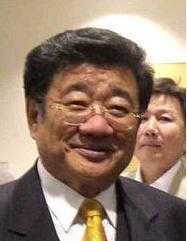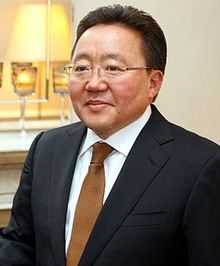President of Mongolia
| President of Mongolia | |
|---|---|
|
State Emblem of Mongolia | |
| Term length | Four years, renewable once |
| Inaugural holder | Punsalmaagiin Ochirbat |
| Formation | 3 September 1992 |
| Website | president.mn |
 |
| This article is part of a series on the politics and government of Mongolia |
|
|
Politics portal |
The President of Mongolia (Mongolian: Монгол Улсын Ерөнхийлөгч, Mongol Ulsyn Yerönkhiilögch) is the head of state of Mongolia.[1] The Constitution of Mongolia implements a parliamentary system, so while he or she does wield significant political power, much of the President's role is ceremonial.
Current President Elbegdorj
1988: Early democracy
In 1988, Mr. Elbegdorj helped organize the first non-communist democratic political movement to create the Mongolian Democratic Union.[2] Mongolia became a democratic country in 1990 and in 1992 held its first national elections.[3]
1990: Beginning of U.S. relations
Modern relations with the United States started in the early 1990s. Then-U.S. President George H.W. Bush sent his Secretary of State, James A. Baker III, to Mongolia to express support for Mongolia's transition to a democratic government.[2]
President Elbegdorj has been known to quote former U.S. president Ronald Reagan as his inspiration for anti-communism and pro-democracy views.[2]
2011-2012: Modernization and expansion
Strategic international growth
According to the New York Times, U.S. President Barack Obama is interested in expanding relations with Mongolia. President Elbegdorj visited the White House in 2011 and U.S. Vice President Joseph Biden visited Elbedorj in Mongolia.[4]
In September 2012, President Elbegdorj addressed the 67th regular session of the United Nations General Assembly. In his address, he said that his main objective in his goal in transforming Mongolia to a democracy was to create a civil society ruled by law.[5]

Anti-corruption and economic growth
President Elbegdorj has pushed for decentralizing budget decisions.[6] His agenda has included anti-corruption and economic growth policies, and Mongolia's economy grew by 17 percent in 2011 and 12 percent in 2012.[3]
Under President Elbegdorj, the country is governed by the rule of law and the government imposes strict punishments for corruption, according to Forbes magazine.[5]
2013: Re-election
In 2013, Mongolia held its sixth free presidential election.[3] Elbegdorj was re-elected to a second term, beating wrestler Badmaanyambuu Bat-Erdene.[3]
The World Bank forecasted the country's 2013 economic growth at 12.5 percent.[7]
2014-2024: Fastest-growing economy in the world
The International Monetary Fund (IMF) has listed Mongolia as one of the world's five fastest-growing economies and expects Mongolia to be the number one fastest-growing economy in the world over the next decade.[3] Economist expect that Mongolia's economy will grow by over 15 percent in 2014.[8] Mongolia is rich in mining resources equivalent to approximately $2 trillion.[8]
In 2014, the Washington Times called Mongolia "Central Asia's most open democratic state."[2]
Election
The President is elected by the citizens of Mongolia. Political parties with representation in the State Great Khural nominate candidates. The President can be re-elected only one time. The President can be removed from office if two-thirds of the Khural find him guilty of abusing his powers or violating his oath.[9] Before inauguration, however, the President-elect has to renounce the membership of any political party.
Powers of the President
- Nominating a candidate for the office of Prime Minister, who is then approved or rejected by the State Great Khural (parliament). This is largely a ceremonial responsibility, as the Khural will most likely reject any nominee who is not its own choice – in effect, the Prime Minister is appointed by the Khural.[9]
- Vetoing the Khural's legislation (can be overridden with a two-thirds majority)[9]
- Approving judicial appointments[9]
- Appointing the Chief Judge of the Supreme Court of Mongolia[10]
- Chairing the national security council[9]
- Acting as commander in chief of the armed forces.[9]
- Nominates the Prosecutor General, the official in charge of implementing the laws, who is then approved or rejected by the Khural.[11]
History
There is debate about who should be considered the first President of Mongolia. The title does not actually date back to before Mongolia's democratisation, but the office itself is seen as extending through Mongolia's period of communist rule. Sometimes, the Bogd Khan (seen as the reincarnations of senior lama) are seen as Mongolia's first "presidents", but more commonly, the title is given to the secular leaders who followed them. Balingiin Tserendorj, who was acting head of state in 1924, is sometimes seen as the first president, but it was not until Navaandorjiin Jadambaa was appointed Chairman of the State Great Khural in November that there was an official leader. Only a day later, the leadership role was reorganized as the Chairman of the Presidium of the State Little Khural (the Little Khural being the executive committee of the Great Khural). Later, the Little Khural was abolished, and its powers were returned to the Great Khural – as such, the title of the president became Chairman of the Presidium of the State Great Khural. This was shortly afterwards changed to Chairman of the Presidium of the People's Great Khural, following a change in nomenclature. Finally, in 1990, the title President of Mongolia was adopted.
List of presidents (since 1992)
People's Revolutionary Party Social Democratic Party Democratic Party
| № | Portrait | Name (Born–Died) |
Elected | Term of office | Party | |
|---|---|---|---|---|---|---|
| 1 |  |
Punsalmaagiin Ochirbat Пунсалмаагийн Очирбат (1942– ) |
3 September 1990 | 6 June 1993 | People's Revolutionary Party | |
| (1) | 1993 | 6 June 1993 | 20 June 1997 | Social Democratic Party | ||
| 2 | .png) |
Natsagiin Bagabandi Нацагийн Багабанди (1950– ) |
1997 | 20 June 1997 | 6 June 2001 | People's Revolutionary Party |
| 2001 | 6 June 2001 | 24 June 2005 | ||||
| 3 |  |
Nambaryn Enkhbayar Намбарын Энхбаяр (1958– ) |
2005 | 24 June 2005 | 18 June 2009 | People's Revolutionary Party |
| 4 |  |
Tsakhiagiin Elbegdorj Цахиагийн Элбэгдорж (1963– ) |
2009 | 18 June 2009 | 10 July 2013 | Democratic Party |
| 2013 | 10 July 2013 | Incumbent (Term expires 10 July 2017) | ||||
Latest election
| Candidate | Party | Votes | % |
|---|---|---|---|
| Tsakhiagiin Elbegdorj | Democratic Party | 622,794 | 50.89 |
| Badmaanyambuugiin Bat-Erdene | Mongolian People's Party | 520,380 | 42.52 |
| Natsagiin Udval | Mongolian People's Revolutionary Party | 80,563 | 6.58 |
| Invalid/blank votes | 13,688 | – | |
| Total | 1,239,784 | 100 | |
| Registered voters/turnout | 1,864,273 | 66.50 | |
| Source: Mongolian Electoral Commission | |||
See also
References and external links
- ↑ Montsame News Agency. Mongolia. 2006, ISBN 99929-0-627-8, p. 42
- ↑ 2.0 2.1 2.2 2.3 Gertz, Bill (3 February 2011). "Mongolian president uses Reagan playbook". The Washington Times (Washington, D.C.). Retrieved 5 March 2014.
- ↑ 3.0 3.1 3.2 3.3 3.4 Mullany, Gerry (26 June 2013). "Mongolia Re-Elects Leader to Another 4-Year Term". The New York Times (New York, NY). Retrieved 5 March 2014.
- ↑ Perlez, Jane (9 July 2012). "From Mongolia, Clinton Takes a Jab at China". The New York Times (New York, NY). Retrieved 5 March 2014.
- ↑ 5.0 5.1 Schoen, Doug (25 September 2012). "Elbegdorj On US Tour". Forbes (New York, NY). Retrieved 5 March 2014.
- ↑ "Elbegdorj scrapes home". The Economist (London, United Kingdom). 29 June 2013. Retrieved 5 March 2014.
- ↑ "Mongolia Economic Update November 2013". The World Bank. Washington, D.C.: The World Bank Group. 6 November 2013. Retrieved 5 March 2014.
- ↑ 8.0 8.1 Sizemore, Charles (12 January 2014). "Frontier Markets: Investing In Mongolia". Forbes (New York, NY). Retrieved 5 March 2014.
- ↑ 9.0 9.1 9.2 9.3 9.4 9.5 Montsame News Agency. Mongolia. 2006, ISBN 99929-0-627-8, p. 43
- ↑ Montsame News Agency. Mongolia. 2006, Montsame News Agency Foreign Service Office, ISBN 99929-0-627-8, p. 45
- ↑ Montsame News Agency. Mongolia. 2006, Foreign Service office of Montsame News Agency, ISBN 99929-0-627-8, p. 44
| |||||||||||||||||||||||||||||||||||||||||
| ||||||||||||||||||